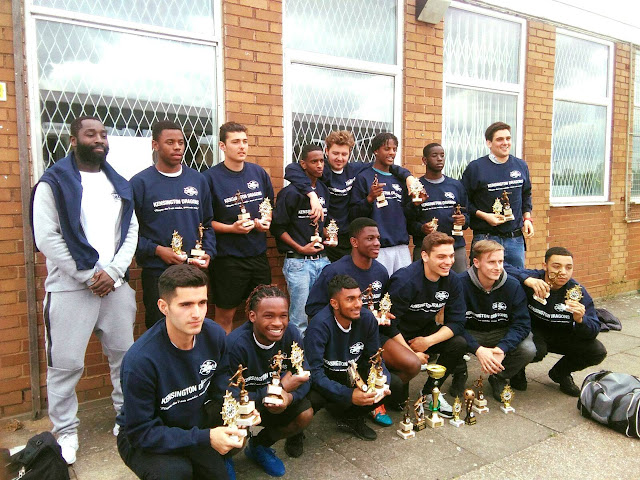INTERVIEW WITH ESTANISLAU QUETA
In this
blogpost, we continue to explore the European sports scene. [1]
[2] This
time, we will present a topic that plays an unreplaceable part in the local culture, even more in the regions we have approached.
That
is football and respectively, futsal. It is no news that they are bringing people
together, whether playing, or watching and cheering favoured teams, family members,
or friends. But more insight into the sports’ unique traits across borders will
be presented through an interview with Estanislau Queta, who played semi-professional
futsal and football for Núcleo de Sintra, in Lisbon, Portugal, and FC Kensington Dragons, in London, UK.
INTERVIEW
Q:
What inspired you to start practising football and futsal?
A: As I am
from Portugal, football was always around while I was growing up. It’s
something that is deeply embedded in our culture and society – everyone is very
dedicated to football. While some people might have a footballer or parent
figure that inspires them, for me it was the social aspects that have drawn me
towards playing.
Q: Having
experienced playing football and futsal in Portugal and the UK, could you
please outline the differences and particularities within the two countries?
A: In few
words – ‘passion’ vs ‘challenge’ – these were the main sources of players’ motivation.
When you play football in the UK, the expectations are oftentimes much higher
than in Portugal, there’s more competitions, more supporters, and more feedback
from coaches to ensure you reach the next level, aiming to play professionally.
In Portugal however, expectations are not as high, people play out of passion,
for the fun of the game, for the opportunities to enjoy time and connect with others. Elseways, a similarity within both countries is that football can be a way out of poverty, a means of empowerment, a source of opportunities.
Estanislau's latter point highlighting the importance football, and more generally, sports, have within societies. Hence, we'd like to raise awareness of this matter, through an official statement.
"We recognize the growing contribution of sport to the realization of development and peace in its promotion of tolerance and respect and the contributions it makes to the empowerment of women and of young people, individuals and communities as well as to health, education and social inclusion objectives." – United Nations
Q: From
a player’ point of view, what are the main differences between football and
futsal, that others should be aware of?
A: Futsal
is ten times more intense than normal football, due to the short bursts, and
the indoor setting, which involves a smaller court with a hard floor, allowing
for less bounce than regular, outdoor pitches. A futsal ball is also heavier.
Due to the higher level of energy players invest, futsal matches take 40
minutes, compared to 90 for a football match.
Q:
What is your goal as a football / futsal player?
A: I have
one more goal – to play for the first team of Coventry University – then plan
on playing just for leisure. I am not aiming to pursue football professionally,
but it will remain a memory forever. Although there was a time when I just
wanted to be the best and break from semi-professional to professional, I
realised that requires a different type of commitment, and I was already approaching
another career path.
Q:
What are your plans for after stepping down from football / futsal?
A: A current
goal is to become a personal trainer by next year, while continuing to prepare
for my long-term objective – to pursue a career as a civil servant or financial
analyst, having studied Economics, which I really enjoyed.
Q: How
do you think football and futsal have impacted your daily life?
A: I
became a dedicated worker and an interactive member in society. As a team
sport, being surrounded by people helped me develop interpersonal skills. It
helped me develop a routine, drive, determination, and self-belief.
Q: And
since we talked about cultural characteristics, have you got any questions
about sports in Japan, or more generally Eastern Asia?
A: Eastern
Asian countries have among some of the most diverse and healthy cuisines in the
world, so I am interested in what and how often athletes eat, and if they follow
any diets. Regarding fitness, although the foundation is similar around the
world, I’d like to know if there’s a certain skillset they tend to focus on
within their practice sessions.
HOME TRAINING ROUTINE
After
our interview, we asked Estanislau for a brief overview of his current home
training routine, which is available on our YouTube channel – Sunbears: Cloud Campus for Sports, through the link below.
The
type of exercises chosen work a wide range of muscles – V Ups – to the whole body – Jumping Jacks – compared to those focused on a specific muscle only. These
tend to be both effective and time-saving, ideal for a home workout routine, as
they involve no equipment, without requiring much space.
V Ups may
improve athletic form, balance, minimising the risk of developing back pain or
other injuries, by strengthening the abdomen and surrounding areas. Such
matters could arise in the context of staying idle too much, at home, at a
computer, etc., which is more likely to happen considering nowadays’ restrictions.
Jumping
Jacks are good for the heart and bones, improving balance,
coordination, and general mood, again, great within the pandemic circumstances,
which has taken its toll on people's mental health, figures of depression and
anxiety having concerningly spiked. Hence, such exercise is advisable as it may
lift your mood and productivity.




Comments
Post a Comment